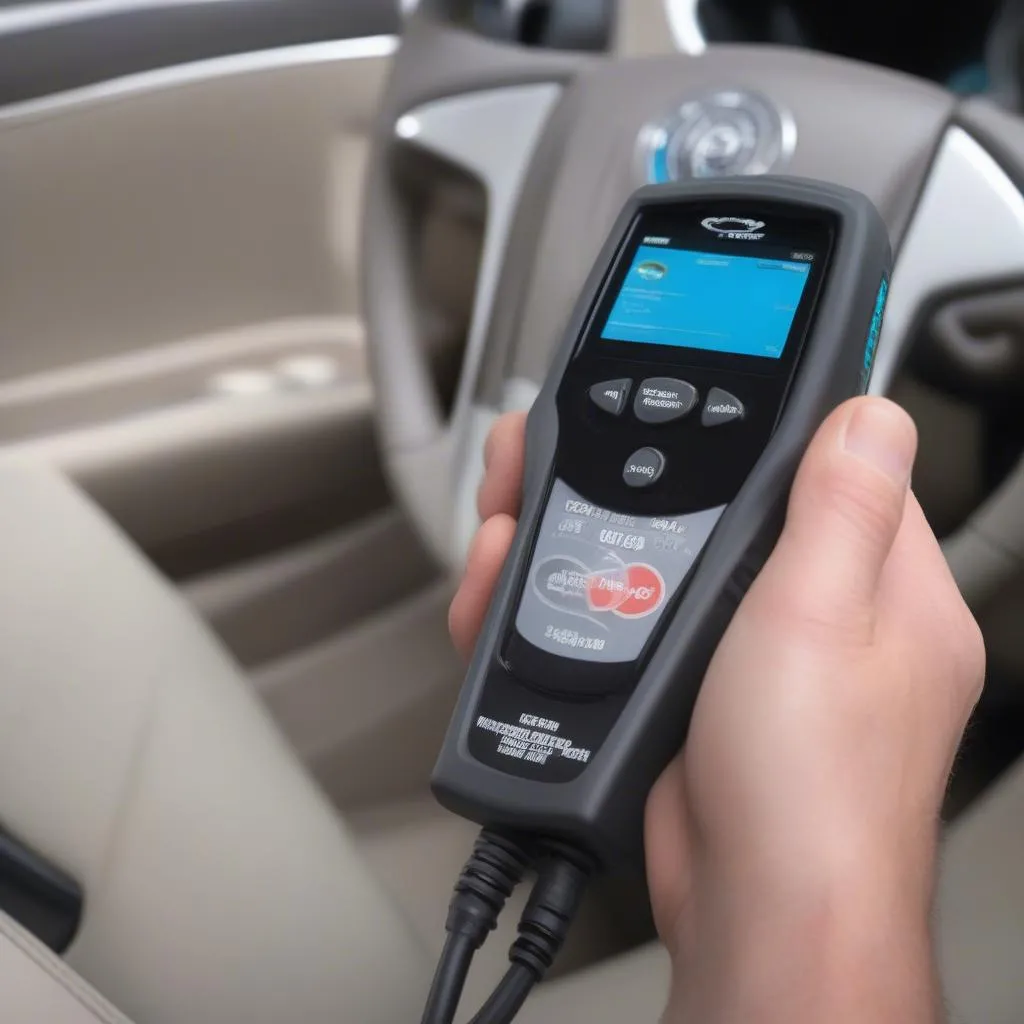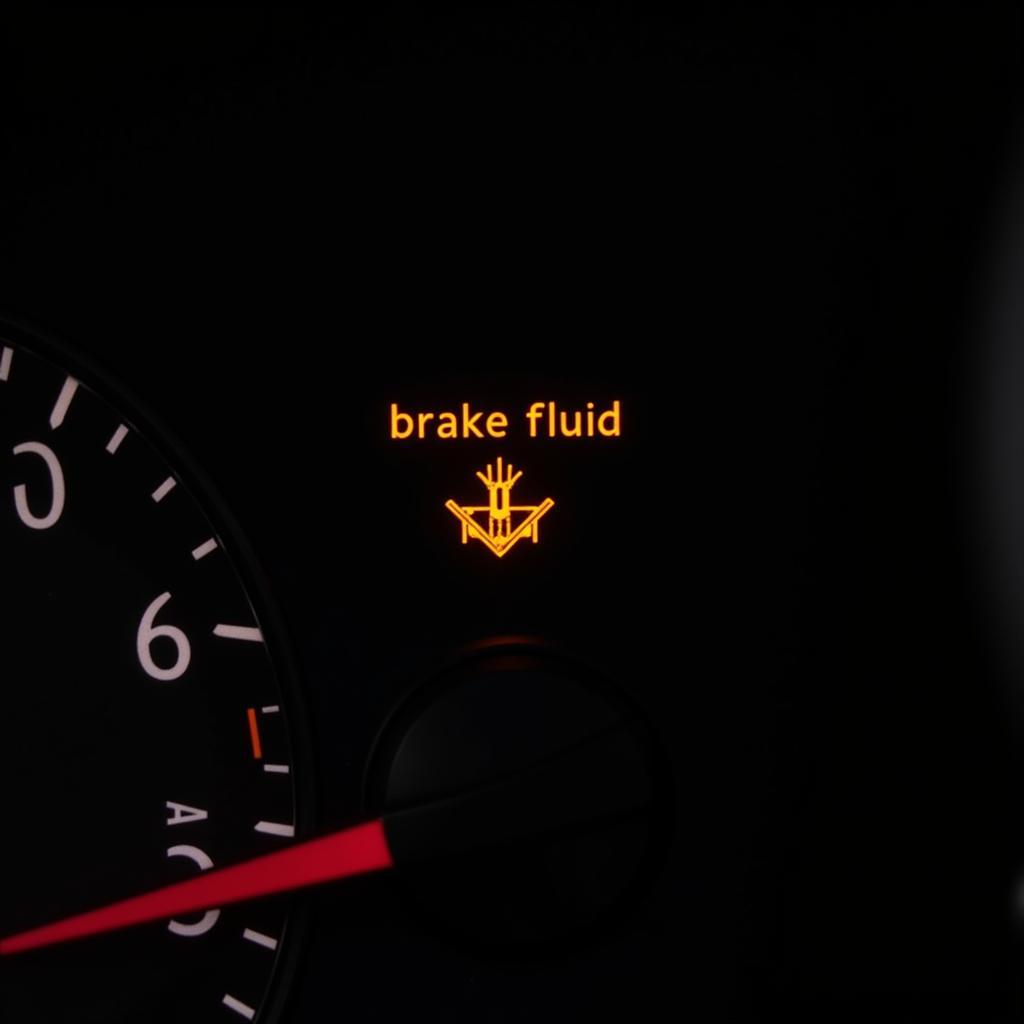A brake warning light glowing on your dashboard is never a welcome sight, especially in a 2009 Honda Civic Hybrid. This model year is known to have some specific issues that can trigger the brake warning light, causing concern for many owners. Whether it’s a minor glitch or a significant problem, understanding the potential causes and knowing how to address them is crucial for your safety and the longevity of your hybrid vehicle. This article dives into the common reasons behind a 2009 Honda Civic Hybrid brake warning and provides insights into troubleshooting and solutions.
Common Culprits Behind the 2009 Honda Civic Hybrid Brake Warning Light
The brake system in your Honda Civic Hybrid is complex, and several components can trigger the warning light. Let’s break down the most prevalent culprits:
- Low Brake Fluid: This is often the most straightforward explanation. Brake fluid naturally diminishes over time, and a leak in the system can accelerate this process. Low brake fluid levels can significantly hamper your car’s ability to brake effectively.
- Worn Brake Pads: Your brake pads are designed to wear down with use. When they become too thin, a sensor embedded within them triggers the warning light, indicating it’s time for a replacement.
- Faulty Brake Light Switch: The brake light switch, activated when you press the brake pedal, could be malfunctioning. A faulty switch might not only illuminate the brake warning light but can also prevent your brake lights from engaging, creating a hazard.
- ABS Sensor Issues: The Anti-lock Braking System (ABS) is crucial for safe braking, especially in slippery conditions. If one or more ABS sensors, which monitor wheel speed, malfunction, they can trigger the warning light.
- Problems with the Hybrid Braking System: The 2009 Honda Civic Hybrid employs a regenerative braking system that works in conjunction with the traditional hydraulic brakes. Issues within this integrated system, such as a problem with the battery or the regenerative braking control module, can also illuminate the warning light.
Troubleshooting Your 2009 Honda Civic Hybrid Brake Warning
Before heading to a mechanic, there are a few preliminary checks you can perform:
- Check Your Brake Fluid: This is the first and easiest step. Locate the brake fluid reservoir under the hood and check the fluid level. If it’s low, adding brake fluid might temporarily solve the issue, but you’ll need to investigate the underlying cause of the low fluid level.
- Inspect Your Brake Lights: Have a friend press the brake pedal while you stand behind the car. Ensure all brake lights are functioning correctly. If not, it could point to a faulty brake light switch.
- Listen for Unusual Noises: When applying the brakes, pay close attention to any unusual sounds like grinding or squealing, which could indicate worn brake pads.
When to Seek Professional Help
If your preliminary checks don’t pinpoint the problem, seeking professional help is essential. Issues with the ABS system or the hybrid braking system require specialized knowledge and tools to diagnose and repair.
Remote Diagnostics and Software Solutions for 2009 Honda Civic Hybrid Brake Issues
In today’s technologically advanced world, remote diagnostics and software solutions have emerged as valuable tools in automotive repair.
- Remote Diagnostics: Services like CARDIAGTECH offer remote diagnostics for your 2009 Honda Civic Hybrid. By connecting to your vehicle’s onboard computer, skilled technicians can read error codes, analyze data, and often identify the root cause of the brake warning light remotely. This eliminates guesswork and allows for a more targeted repair approach.
- Software Updates and Programming: Sometimes, the culprit behind a brake warning light might be a software glitch. Remote programming services can update your car’s software, ensuring all systems function harmoniously and potentially resolving the issue.
Ignoring the Warning is Never an Option
A glowing brake warning light should never be ignored. Addressing the issue promptly ensures your safety and prevents potentially more costly repairs down the line.
FAQs About 2009 Honda Civic Hybrid Brake Warning
Q: Can I drive my Honda Civic Hybrid with the brake warning light on?
A: It’s not advisable. The brake warning light signals a potential issue with your braking system. Continuing to drive could be dangerous.
Q: How often should I change my brake fluid?
A: Consult your owner’s manual for specific recommendations, but a good rule of thumb is to have your brake fluid flushed and replaced every 2-3 years.
Q: Are brake repairs expensive on a 2009 Honda Civic Hybrid?
A: The cost depends on the issue. Simple fixes like brake pad replacements are relatively affordable. However, issues with the ABS or the hybrid system can be more costly.
honda civic hybrid 2009 brake system warning light
Conclusion
A brake warning light on your 2009 Honda Civic Hybrid shouldn’t be taken lightly. Understanding the common causes, performing some basic troubleshooting, and knowing when to seek professional help are crucial steps in ensuring your safety and the optimal performance of your vehicle. By taking proactive measures, you can address the issue quickly and confidently get back on the road.


